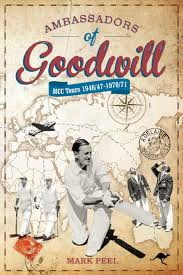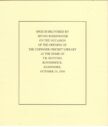Ambassadors of Goodwill
Martin Chandler |Published: 2018
Pages: 287
Author: Peel, Mark
Publisher: Pitch Publishing
Rating: 4 stars

In the 1990s Mark Peel published biographies of three England cricketers; Colin Milburn, Colin Cowdrey and Kenny Barrington. Since then we have not heard from him, but I am pleased to be able to report that he has spent his time productively, and the result is this excellent book of cricket history. I originally typed in the adjective modern there, but on reflection as the last of the tours he chronicles took place almost half a century ago I felt it probably wasn’t appropriate.
Ambassadors of Goodwill begins in 1945 with the MCC’s decision, against the better judgment of some, to send a team to Australia in 1946/47. There is then a chapter on that tour, followed by a look at every other Test tour the MCC embarked on between then and 1970/71 when Ray Illingworth’s side regained the Ashes in Australia. The title of the book, which gives a clue to its mission statement, comes from the words of the Labour Prime Minister Clement Attlee who, at a dinner at Lord’s shortly before the 1946/47 party left England, made a speech underlining the importance of the team’s ambassadorial role. Also featured is a quote from Illingworth, who used the phrase in a rather different context.
This is the sort of book it is relatively easy to write, but difficult to write well. There is plenty of compelling action to describe, and no shortage of source material. The period in question coincided with the heyday of the tour book, and there are also plenty of more or less contemporary ghosted autobiographies of the leading players. In even greater abundance are later and more measured books of reflection as well as biographies written with varying degrees of objectivity. The measure of the diligence with which Peel approached his task is that his list of sources comprises as many as 184 books and 34 newspapers and magazines, as well as the ubiquitous Wisden and the main internet sources.
The potential trap for Mark Peel was that however well he marshalled the material in front of him, and however well written his summaries were, he would ultimately end up saying nothing that was new. In one sense he does get caught, in that nothing ground breaking does emerge from his researches, but he did have an ace up his sleeve by obtaining access to the MCC archives, and more particularly the reports prepared by the captains and managers at the conclusion of the tours. So even though most of what those documents contain has emerged over the years, their availability gives the chapters on each tour an authority they might otherwise lack. They also add some interesting details of the more controversial trips, particularly that to the West Indies of 1953/54.
It is inevitable that any book about cricket tours will include descriptions of Test matches and Ambassadors of Goodwill is no exception. That much conceded the book is as much about the touring experience and the relationships between players, management and their hosts as anything else. The many tensions in those ties are dwelt on, and the drawing together of so many sources helps to add context to the individual accounts that many readers will already be familiar with.
Of particular interest are the chapters which deal with tours of the sub-continent, of which there were four in the quarter of a century the book covers. The first of these, in 1951/52, was written up in book form but only by Indian writers. England fielded what was very much a second eleven under the command of Lancashire skipper Nigel Howard who, as a batsman, was certainly out of his depth. The next trip, ten years later, was led by a batsman of real class, Ted Dexter, but again was some way short of the full strength of England. It is not a tour that received too much attention in England at the time, and it has certainly had very little since. Two years later England were out in India again, this time, a number of lessons being learned, for a much shorter trip. The stories of these tours are illuminating.
The last of the four sub-continental trips was an ill starred visit to Pakistan, hastily arranged against a backdrop of severe political unrest in the country as a means of making up at least some of the revenue lost from the late cancellation of the South African tour that had been scheduled to take place in 1968/69. The most notable omission from Peel’s bibliography is Qamaruddin Butt’s account of this tour, the last and best of that prolific chronicler’s ten tour books.
Of course a book on MCC tours must include a chapter on that cancelled South African trip, the well known ‘D’Oliveira Affair’, and Peel’s is no exception. It is an interesting chapter too, although it will disappoint the conspiracy theorists. Not for the first time in recent years a thorough review of the available evidence strongly suggests that political considerations did not influence the selection decisions that were made.
In the 21st century players fly in and out of tours, and entire trips take no more than a few weeks at most. It is a far cry from the days of 1946/47 when the sea voyage out alone took as long as some two or three Test series do today, and the entire trip took the best part of eight months out of the lives of the players. Even in 1970/71, by which time the leisurely sailings had been replaced by air travel, the tours still took more than four months. The long separations from wives and children were significant factors and that issue commands an interesting chapter of its own.
Anyone with an interest in the game will enjoy Ambassadors of Goodwill. For those already familiar with these tours who have read some of the books about them it is interesting to see all the strands of the stories drawn together. For those relatively new to the subject it contains a fascinating story of how cricket tours fundamentally changed in the years after the Second World War. Either way the book is highly recommended.






Leave a comment